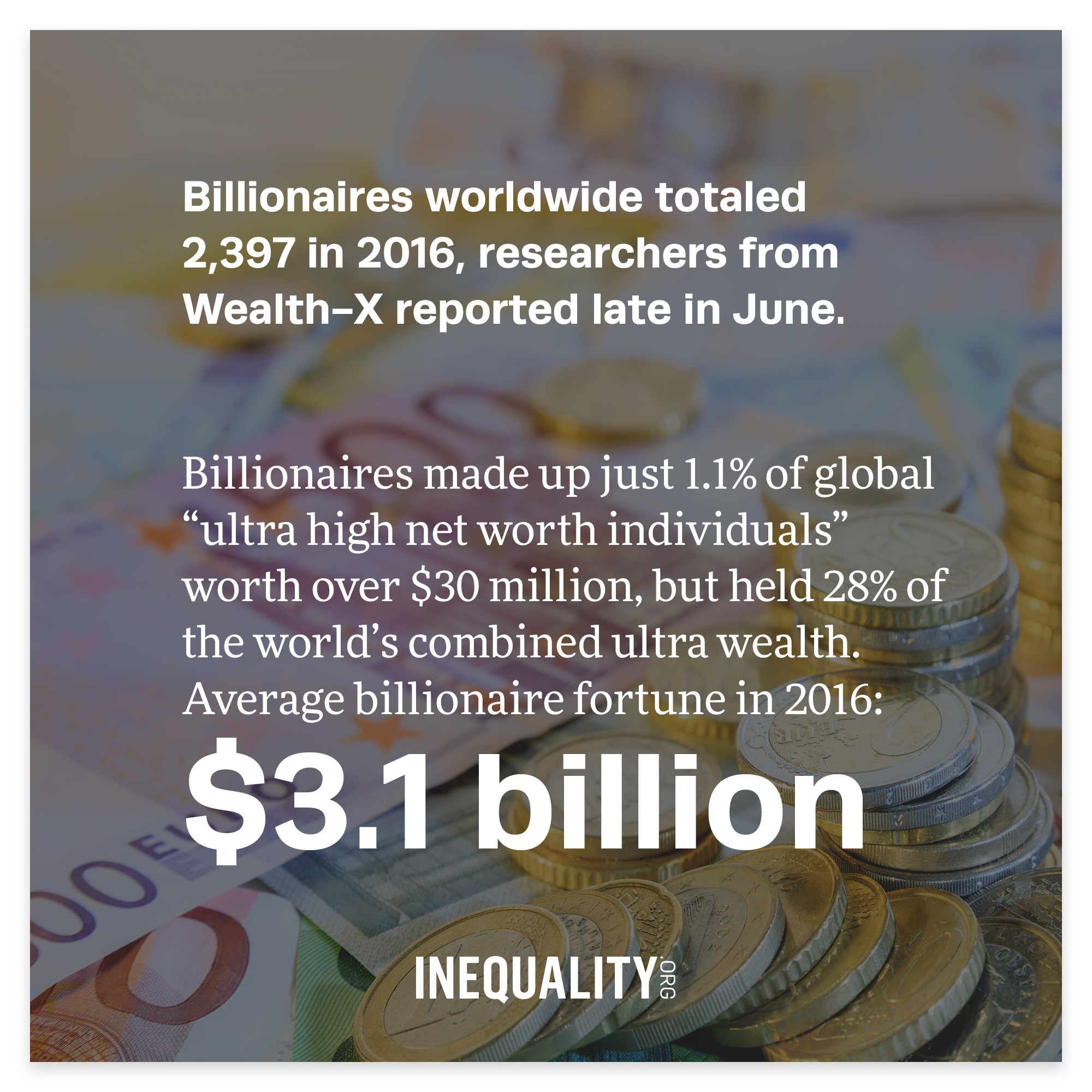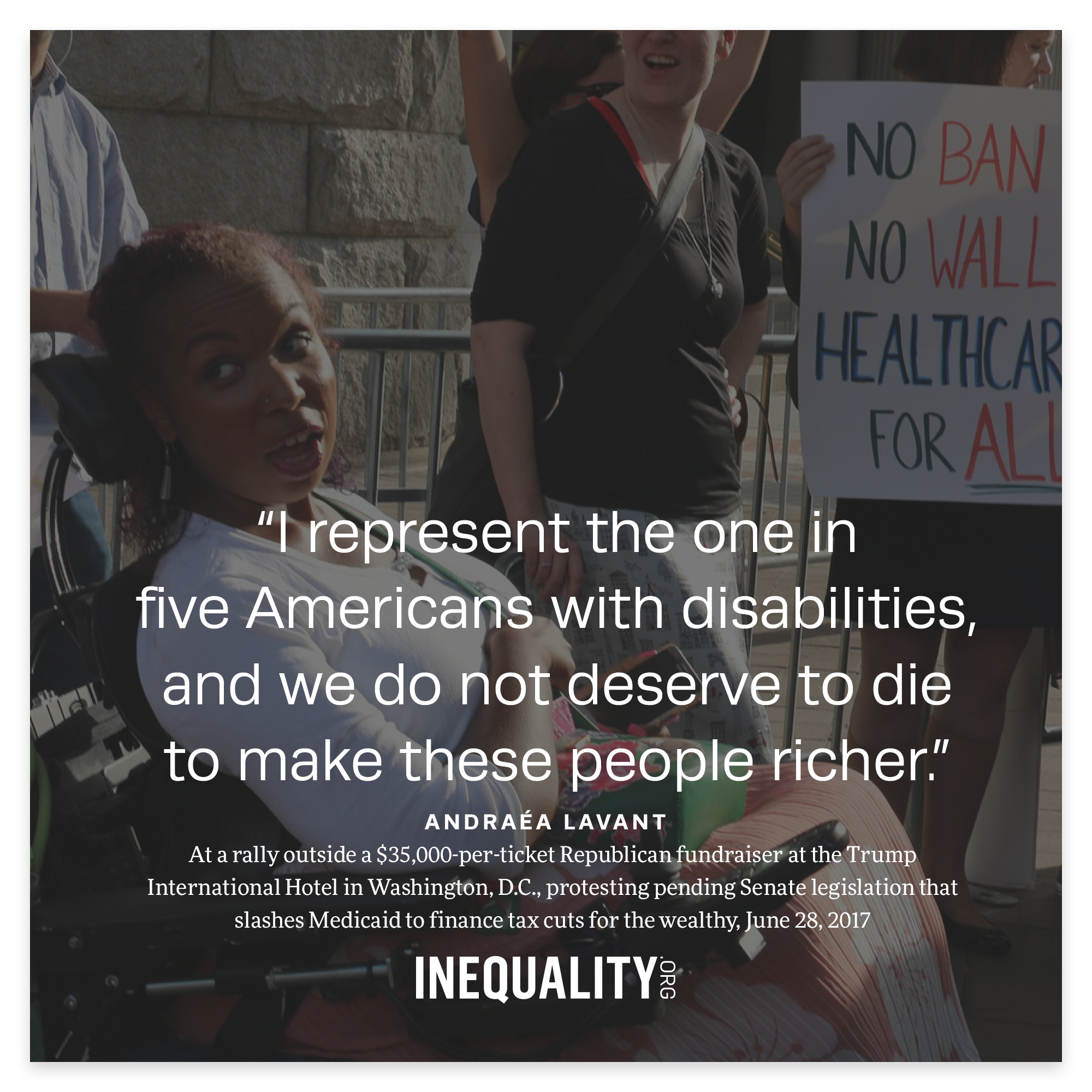|
THIS WEEK
|
Congress is taking the week off to celebrate the nation’s birthday this week. Normally that might garner some snide comments about the light workload on Capitol Hill, but I for one would much rather see members of Congress working a barbeque than cutting health care to fund huge tax cuts for the rich. But, hey, maybe that’s just me.
Meanwhile, we’re hitting our stride here with our new Inequality.org offerings. We have more articles, social media posts, and engagement from readers like you than we’ve ever had before. We really appreciate the feedback so many of you have shared. Please keep it coming — and enjoy the holiday!
Chuck Collins, for the Institute for Policy Studies Inequality.org team |
|
|
|
|
INEQUALITY BY THE NUMBERS
|
 |
|
|
|
|
|
|
FACES ON THE FRONTLINES
|
 |
| Fighting to Protect Our Fastest-Growing Workforce |
|
The Senate Republican health care plan would deliver a tax-cut windfall to the wealthy while striking a deadly blow to homecare workers and the millions of elderly and disabled Americans who rely on their services. Under Obamacare, homecare has become the fastest-growing U.S. occupation, as Medicaid expansion has allowed more people to receive the services they need. With these benefits now under attack, the National Domestic Workers Alliance is lifting up the voices of caregivers around the country to demand a better way.
|
|
|
|
|
|
|
WORDS OF WISDOM
|
 |
|
|
|
|
|
PETULANT PLUTOCRAT
OF THE WEEK
|
|
A Notorious Executive Shows Zilch Remorse
|
|
Martin Shkreli, the former pharmaceutical exec who became the face of corporate greed two years ago when he hiked the price of a life-saving drug from $13.50 to $750 a pill, may be going to jail — but not for price gouging. Federal prosecutors are charging that Shkreli ran a Ponzi-like scheme to conceal big losses in a hedge fund he ran. Shkreli’s trial started last week in Brooklyn, and the 34-year-old remains as defiant as ever. During jury selection, he railed against “fake news” and yawned conspicuously, reminding media observers of his smirking last year at a congressional hearing. After that hearing, Shkreli called the lawmakers who grilled him “imbeciles.” Mainstream drug companies have been trying to paint Shkreli as an industry bad apple. But they keep raising prices, too. Pfizer has this year hiked prices on 91 drugs by 20 percent. |
|
|
|
|
MUST READS
|
A busy week at Inequality.org! From Josh Hoxie, a take-down of a widely publicized — and deeply flawed — critical study on Seattle’s higher minimum wage and a look at Donald Trump’s three-step plan to dupe the public on tax cuts. Chuck Collins explores what reparations could look like in the United States and digs into the new research on the global rich and their enormous stashes of hidden wealth.
Also this week, Alyssa Aquino explains how crushing student debt is shoving a generation of people trained to enter public service onto Wall Street, and economist Robert Frank offers a personal reflection on the role luck plays in our lives — and the impact of good fortune on grand fortune.
Elsewhere on the web: Justin Miller investigates in the American Prospect how an attempt in Kansas “to create supply-side nirvana in Middle America” left a conservative state rejecting the trickle-down economics of tax cuts for the rich. In other rich-people-gone-wild news, Heather Corcoran writes in Salon on a nefarious habit of 1 percenters: using art to launder dirty money and avoid taxes.
Across the pond, things look equally bleak. Yves Smith of Naked Capitalism parses the threat of modern inequality in Britain and what can be done to undo it. Also focusing on UK inequality, Sally Weale looks in the Guardian at a damning new study showing that recent governments haven’t done nearly enough to tackle a fragmented society. |
|
|
|
|
GREED AT A GLANCE
|
 |
|
|
|
|
|
|
TOO MUCH
|
|
A July 4 Dream: Ending the ‘Politics of Deference’
|
|
Most all the early leaders of the American nation shared a commitment, as Connecticut minister Benjamin Trumbull put it, “not to suffer a few persons to amass all the riches and wealth” of their young nation. Nothing would do more to ensure the success of the new American republic, Noah Webster would proclaim after the Revolution, than achieving “a general and tolerably equal distribution of landed property.” Nothing would destroy that republic quicker, he told his peers, than tolerating a “vast inequality of fortunes.” We would do well to heed that counsel. |
|
|
|
|
|
|
A FINAL FIGURE
|
 |
|
|
|
|
|
|